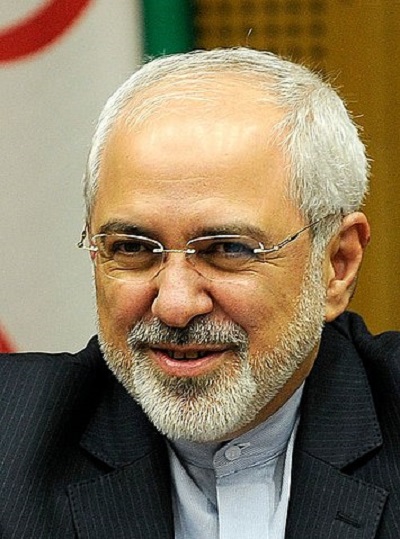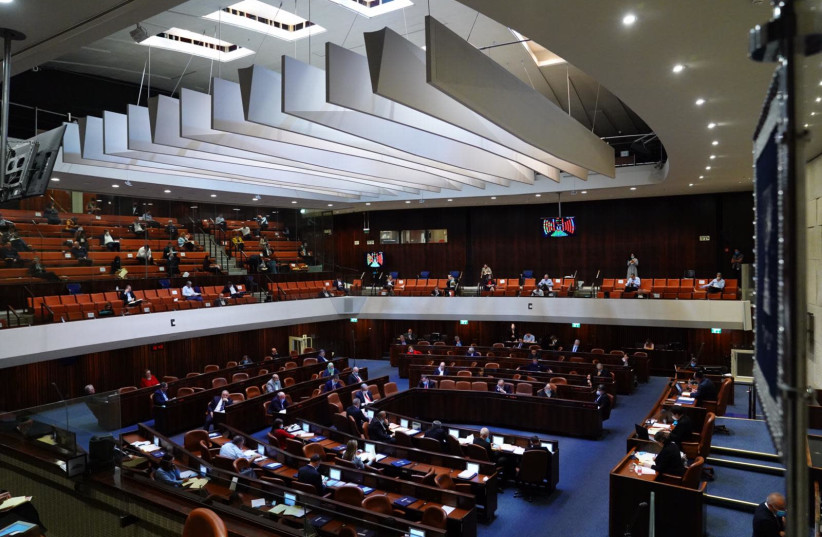 Iran: Mimo pandemii Ayatollah wzywa do dżihadu przeciw żydowskiemu państwu
Iran: Mimo pandemii Ayatollah wzywa do dżihadu przeciw żydowskiemu państwu
Majid Rafizadeh
Tłumaczenie: Andrzej Koraszewski
 Jest zdumiewające, że Twitter, który tak lubieżnie oddaje się cenzurowaniu, nadal pozwala irańskiemu ministrowi spraw zagranicznych Dżawadowi Zarifowi (na zdjęciu) oraz innym irańskim przywódcom szerzyć na swojej platformie neonazistowski język i antysemickie poglądy. (Zdjęcie: wikipedia)
Jest zdumiewające, że Twitter, który tak lubieżnie oddaje się cenzurowaniu, nadal pozwala irańskiemu ministrowi spraw zagranicznych Dżawadowi Zarifowi (na zdjęciu) oraz innym irańskim przywódcom szerzyć na swojej platformie neonazistowski język i antysemickie poglądy. (Zdjęcie: wikipedia)
Zamiast koncentrować się na wspieraniu poprawy standardów życia swoich obywateli, priorytetem rządzących w Iranie mułłów wydaje się być szerzenie antysemityzmu.
Najwyższy Przywódca, ajatollah Chamenei niedawno nazwał Izrael “rakowatym guzem, który musi być zniszczony”, obiecał “poparcie dla każdego narodu lub ugrupowania, które walczy z Izraelem”, wezwał również palestyńskich bojówkarzy do ściślejszej współpracy i do “rozszerzenia pola dżihadu na wszystkie palestyńskie ziemie.”
Reżim irański, od czasu islamskiej rewolucji w 1979 roku, należy do głównych sponsorów organizacji terrorystycznych atakujących Izrael. Niektórzy przywódcy przyznali, że Teheran jest ich militarną i finansową ostoją i że ich przetrwanie zależy od Iranu.
Ismail Hanija, kierujący biurem politycznym Hamasu, niedawno wychwalał iranski reżim, za to że jest głównym dostawcą środków finansowych i militarnych dla Hamasu. Na nagranym 20 maja 2020 przemówieniu Hanija podkreślał:
“Istotą tej strategii jest projekt oporu. Pełnego oporu, włącznie ze zbrojnym militarnym oporem na czele. Z tego miejsca pozdrawiam te elementy narodu, które obejmują i wspierają wybór oporu na ziemi Palestyny.”
Mówił również, że szczególnie dziękuje Islamskiej Republice Iranu, która nie zawodzi we wspieraniu oporu finansowo, militarnie i swoją technologią. To jest strategia Republiki, która została ustanowiona przez imama Chomeiniego, niech Bóg ma miłosierdzie dla jego duszy”.
Hassan Nasrallah, przywódca Hezbollahu, libańskiej grupy szyickich ekstremistów, również przyznał, że przetrwanie Hezbollahu jest uzależnione od Iranu: „Nie ukrywamy faktu, że budżet Hezbollahu, jego dochody, wydatki, wszystko co jemy i pijemy, nasze rakiety i inna broń są z Islamskiej Republiki Iranu” – powiedział. Dodał również, że jego ugrupowanie „nie będzie dotknięte żadnym rodzajem sankcji”.
W swoim najnowszym przemówieniu irański Najwyższy Przywódca powiedział, że ”Syjonistyczny reżim jest… śmiertelnym… szkodnikiem w regionie. Zostanie bez wątpienia wykorzeniony i zniszczony.” Irańska gazeta rządowa głosiła podobne antyizraelskie groźby. Na pierwszej stronie największego dziennika irańskiego „Kayhan” tytuł brzmiał, “Zwycięstwo nad wirusem syjonizmu jest gwarantowane.” Oficjalna stona internetowa Chameneiego opublikowała niedawno zdjęcie afisza z następującym tekstem: “Palestyna będzie wolna. Ostateczne rozwiązanie: Opór aż do referendum.”
Ci ludzie Zachodu,którzy określają irańskiego ministra spraw zagranicznych Dżawada Zarifa, jako umiarkowanego, powinni wiedzieć, że zamieścił na swoim koncie Twittera to samo zdjęcie z tym nazistowskim eufemizmem z takim komentarzem:
“Obrzydliwe, że ci, których cywilizacja wynalazła ’ostateczne rozwiązanie’ w komorach gazowych atakują tych, którzy dąża do prawdziwego rozwiązania przy urnach wyborczych, przez REFERENDUM. Dlaczego USA i Zachód tak boją się demokracji? Palestyńczycy nie powinni płacić za wasze zbrodnie i wasze poczucie winy.”
Izraelski premier Benjamin Netanjahu, zareagował na to, mówiąc:
“Groźba Chameneiego przeprowadzenia ‘ostatecznego rozwiązania’ Izraela jest przypomnieniem nazistowskiego planu ‘ostatecznego rozwiązania’, planu zniszczenia żydowskiego narodu. Powinien wiedzieć, że jakikolwiek reżim grożący Izraelowi eksterminacją jego ludności naraża się na analogiczne niebezpieczeństwo.”
Chamenei po namyśle odpowiedział, że nie miał na myśli zniszczenia żydowskiego narodu, tylko zniszczenie Izraela.
Jest zdumiewające, że Twitter, który tak lubieżnie oddaje się cenzurowaniu, nadal pozwala irańskiemu ministrowi spraw zagranicznych Dżawadowi Zarifowi oraz innym irańskim przywódcom na szerzenie na swojej platformie neonazistowskiego języka i antysemickich poglądów. Od dawna “Big Tech” — Google, Facebook, YouTube i Twitter – nie są ”neutralnymi” przekaźnikami informacji, nie są tylko narzędziami. Stały się amerykańską Policją Myśli. Powinny, i to w trybie pilnym, zostać poddane takim samym regulacjom jak media.
W sprawie Iranu amerykański Sekretarz Stanu Mike Pompeo zasadnie oskarżył Chameneiego i Zarifa o “powtarzanie wezwań Adolfa Hitlera do ludobójstwa ” i odpowiedział tweetem:
“To nieprawdopodobne, że @JZarif oraz irański Najwyższy Przywódca powtarzają wezwanie Hitlera do ludobójstwa. Ta amoralność powinna rozproszyć wszelkie wątpliwości, czy ten reżim należy do rodziny narodów. Wraz z Niemcami i Izraelem stajemy przeciwko tej najstarszej & najbardziej nikczemnej formie nienawiści i mówimy #Nigdy więcej.”
Międzynarodowa społeczność powinna pociągnąć do odpowiedzialności rządzących w Iranie mułłów za grożenie zniszczeniem państwa żydowskiego – członka Organizacji Narodów Zjednoczonych. Te groźby są nie tylko nieakceptowalne z punktu widzenia Artykułu 2(1)-(5) Rozdziału Pierwszego) Karty Narodów Zjednoczonych, który mówi: ”Wszyscy Członkowie w swoich stosunkach mięczynarodowych powinni powstrzymać się od gróźb lub użycia siły przeciw terytorialnej integralności lub politycznej niepodległości innych państw…” Jest również nieakceptowalne to, że Narody Zjednoczone i międzynarodowa społeczność stosują podwójne standardy i nadal milczą na temat irańskich gróźb wobec izraelskich obywateli – by nie wspomnieć nawet brutalnych działań irańskich władz przeciwko własnym obywatelom ( patrz tutaj, tutaj, tutaj i tutaj).
Spróbujcie sobie wyobrazić odwrotną sytuacje, w której to Izrael grozi zniszczeniem Iranu. Międzynarodowa społeczność kipiałaby z oburzenia, występując w obronie irańskiej dyktatury. Być może przyszedł czas (i tak dawno spóźniony), żeby Stany Zjednoczone przestały finansować ONZ, która wydaje się wyłącznie wzmacniać niesprawiedliwość i zbrojne konflikty. Najmniejsze co Ameryka powinna zrobić, zamiast automatycznie każdego roku wpłacać czwartą część budżetu ONZ (na przykład w 2017 roku Sany Zjednoczone wpłaciły ponad 10 miliardów dolarów, i ta suma z pewnością nie zmniejszyła się od tego czasu), zgodnie z propozycją byłego ambasadora USA przy ONZ, Johna R. Boltona, Ameryka powinna zacząć płacić ”tylko za to, czego chce i oczekiwać, że dostanie to, za co płaci”.
Pod żadnym warunkiem Stany Zjednoczone, ONZ czy inna organizacja (czytaj Unia Europejska), nie powinny wspierać zbrodniczych mułłów z Iranu.
 Majid Rafizadeh – Amerykański politolog irańskiego pochodzenia. Wykładowca na Harvard University, Przewodniczący International American Council. Członek zarządu Harvard International Review.
Majid Rafizadeh – Amerykański politolog irańskiego pochodzenia. Wykładowca na Harvard University, Przewodniczący International American Council. Członek zarządu Harvard International Review.
Zawartość publikowanych artykułów i materiałów nie reprezentuje poglądów ani opinii Reunion’68,
ani też webmastera Blogu Reunion’68, chyba ze jest to wyraźnie zaznaczone.
Twoje uwagi, linki, własne artykuły lub wiadomości prześlij na adres:
webmaster@reunion68.com




